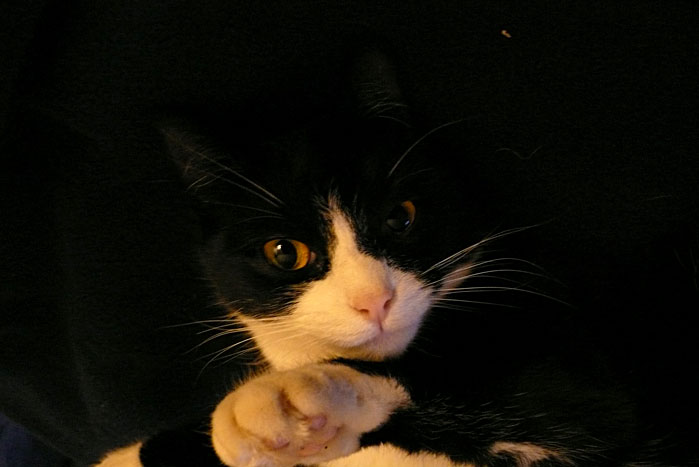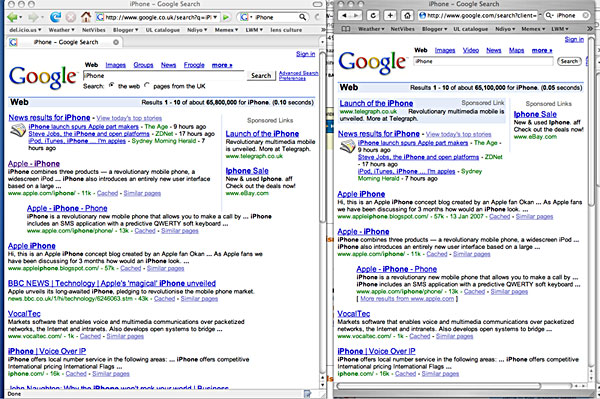
Zoombini, looking purposeful when threatened with a Vario-Elmarit.


Zoombini, looking purposeful when threatened with a Vario-Elmarit.
From the New York Times
WASHINGTON, Jan. 12 — The senior Pentagon official in charge of military detainees suspected of terrorism said in an interview this week that he was dismayed that lawyers at many of the nation’s top firms were representing prisoners at Guantánamo Bay, Cuba, and that the firms’ corporate clients should consider ending their business ties.
The comments by Charles D. Stimson, the deputy assistant secretary of defense for detainee affairs, produced an instant torrent of anger from lawyers, legal ethics specialists and bar association officials, who said Friday that his comments were repellent and displayed an ignorance of the duties of lawyers to represent people in legal trouble.
“This is prejudicial to the administration of justice,” said Stephen Gillers, a law professor at New York University and an authority on legal ethics. “It’s possible that lawyers willing to undertake what has been long viewed as an admirable chore will decline to do so for fear of antagonizing important clients.
“We have a senior government official suggesting that representing these people somehow compromises American interests, and he even names the firms, giving a target to corporate America.”
Mr. Stimson made his remarks in an interview on Thursday with Federal News Radio, a local Washington-based station that is aimed at an audience of government employees.
The same point appeared Friday on the editorial page of The Wall Street Journal, where Robert L. Pollock, a member of the newspaper’s editorial board, cited the list of law firms and quoted an unnamed “senior U.S. official” as saying, “Corporate C.E.O.’s seeing this should ask firms to choose between lucrative retainers and representing terrorists.”
Stimson — who, incredibly, is himself a lawyer, then went on to name more than a dozen of the firms listed on the 14-page report provided [under a FOIA application], describing them as “the major law firms in this country.”
He said, “I think, quite honestly, when corporate C.E.O.’s see that those firms are representing the very terrorists who hit their bottom line back in 2001, those C.E.O.’s are going to make those law firms choose between representing terrorists or representing reputable firms, and I think that is going to have major play in the next few weeks. And we want to watch that play out.”
Karen J. Mathis, a Denver lawyer who is president of the American Bar Association, said: “Lawyers represent people in criminal cases to fulfill a core American value: the treatment of all people equally before the law. To impugn those who are doing this critical work — and doing it on a volunteer basis — is deeply offensive to members of the legal profession, and we hope to all Americans.”
See below! Must get my eyes tested.
Lovely video mash-up by Will Head.
Nice column by Randall Stross…
STEVE JOBS, Apple’s showman nonpareil, provided the first public glimpse of the iPhone last week — gorgeous, feature-laden and pricey. While following the master magician’s gestures, it was easy to overlook a most disappointing aspect: like its slimmer iPod siblings, the iPhone’s music-playing function will be limited by factory-installed “crippleware.”
If “crippleware” seems an unduly harsh description, it balances the euphemistic names that the industry uses for copy protection. Apple officially calls its own standard “FairPlay,” but fair it is not.
The term “crippleware” comes from the plaintiff in a class-action lawsuit, Melanie Tucker v. Apple Computer Inc., that is making its way through Federal District Court in Northern California. The suit contends that Apple unfairly restricts consumer choice because it does not load onto the iPod the software needed to play music that uses Microsoft’s copy-protection standard, in addition to Apple’s own. Ms. Tucker’s core argument is that the absence of another company’s software on the iPod constitutes “crippleware.”
I disagree. It is Apple’s own copy-protection software itself that cripples the device…

If you type “iPhone” into the Google search bars in Firefox (left) and Safari (right), you get subtly different results. Why? After all, one is querying the same search engine.
Thanks to Pete for pointing it out.
Later: Many thanks to all who emailed pointing out that one search was on google.co.uk and the other on google.com. The great thing about the Web is that it enables one to expose one’s ignorance/carelessness so comprehensively. Headgear being eaten as you read this.
This morning’s Observer column…
Let us now brandish a clove of garlic and dispel the Reality Distortion Field for a moment. The iPhone looks like a cute gadget, but it does raise awkward questions. Will its screen scratch as easily as the iPod Nano’s does? Will it be as unreliable as the iPod range appears to be? (I speak from bitter experience.) Why does it have a built-in battery, just like the iPods? Will users have to send their phones back to Apple when the batteries give up the ghost? How robust is the mobile version of OS X – the phone’s operating system? Why is the mobile connectivity not 3G? And how did Apple come to overlook the awkward fact that the ‘iPhone’ name belongs to Cisco?
Answers, please – engraved on the back of a dead iPod – to Steven P Jobs, Apple Inc, 1 Infinite Loop, Cupertino, CA 95014, USA.
One’s personality and vision are shaped by other writers, by movies, by paintings, by music. But the work itself, you know — sentence by sentence, page by page — it’s much too intimate, much too private, to come from anywhere but deep inside the writer himself. It comes out of all the time a writer wastes. We stand around, look out of the window, walk down the hall, come pack to the page, and, in those intervals, something subterranean is forming, a literal dream that comes out of daydreaming. It’s too deep to be attributed to clear sources.
From a conversation with David Remnick that was published originally in the New Yorker and later in Reporting.
Thoughtful column by the Guardian‘s music critic, Dorian Lynskey, reflecting on the commenting that now follows almost every piece on the paper’s website…
I’m not convinced, though, that what might politely be described as “robust” debate on the blog generates light as well as heat. The internet has always licensed people to be far ruder than they would be in a face-to-face encounter. In 1990, US attorney Mike Godwin formulated Godwin’s Law: “As an online discussion grows longer, the probability of a comparison involving Nazis or Hitler approaches one.” Similarly, as an arts blog discussion grows longer, the probability of the writer being branded “smug”, “pointless”, “arrogant” or “London-obsessed” approaches one.
There is an appetite for genuine debate on the web, but it is often drowned out by the howling of people who seem to regard the very existence of professional critics as an outrageous affront. The subtext is this: anyone can be a critic, so anyone who has the temerity to be paid for the privilege deserves to be put in the stocks.
This is just one front in a wide-ranging battle between the blogosphere and so-called old media. In an ideal world, there should be room for both print critics and online ones, with plenty of overlap between them. Good writing is good writing, wherever it appears. But the campaign is in its early days and there are several years’ worth of grievances to thrash out before a peace treaty can be agreed.
Many of the people who post on blogs appear to be annoyed not by what the writers say so much as the fact that they’re in a position to say it. You can spot this type because they write things like: “You’ve only written this to provoke a reaction.” Or: “Why did you even write this? What a waste of time.” As if writing to complain about a waste of time were not, in fact, a bigger waste of time. Or, my favourite: “Typical Guardian.” Perhaps they also post on the website of Practical Caravan magazine, complaining: “Typical Practical Caravan. So caravancentric.”
The most belligerent voices on the blogs speak with either a weary, condescending sneer or a florid pomposity redolent of Ignatius J Reilly in A Confederacy of Dunces. If, as they imply, their taste is flawless and their intellect mighty, then perhaps they could find a better use for these prodigious gifts than taking potshots on websites. Just a thought…
From the extraordinary Inside Iraq Blog maintained by the McClatchy Baghdad Bureau…
A couple of weeks ago it was time for my wife to deliver a baby girl, in that day me, my wife, my mother and my wife’s mother headed to the hospital in karada area at about 7:30 am, its usually takes between 30 – 40 minutes with the normal traffic but in that day something happened!!!! A car bomb exploded almost half way to the hospital and the only way which led to the hospital was blocked for many hours, I could see my wife started getting very worried and I was too but I tried not to show her about my concerns, the traffic was not moving at all for a couple of hours and I was worried that my wife might start having delivery pain but thank god we made it after 4 hours and it was the longest hours in my life, after all I had a beautiful baby daughter that made me forget the long tiring day.